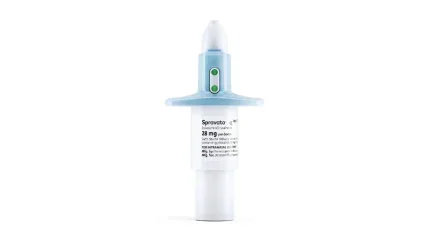
Johnson & Johnson (J&J) has received the US Food and Drug Administration (FDA) approval for Spravato (esketamine) to treat major depressive disorder (MDD).
Spravato is a non-selective, non-competitive antagonist of the N-methyl-D-aspartate (NMDA) receptor, believed to work differently by acting on the glutamate pathway in the brain.
In 2019, the drug was approved to treat adults with MDD, who have had an inadequate response to at least two oral antidepressants, or treatment-resistant depression (TRD).
The indication was later expanded to include patients with MDD who experience acute suicidal thoughts or behaviour.
With the current approval of the company’s supplemental New Drug Application (sNDA), which follows a Priority Review, Spravato becomes the only monotherapy for MDD.
The FDA approval is supported by positive results from a randomised, double-blind, multicentre, placebo-controlled study.
In the study, Spravato alone showed a rapid and superior improvement in the Montgomery-Asberg Depression Rating Scale (MADRS) total score, compared to placebo.
In a post-hoc analysis, Spravato showed an improvement across all ten MADRS items.
Spravato showed a safety profile that was consistent with the existing clinical and real-world data when used with oral antidepressants, with no new safety concerns identified.
Johnson & Johnson Innovative Medicine neuroscience global therapeutic area head Bill Martin said: “Treatment-resistant depression can be very complicated, especially for patients who do not respond to oral antidepressants or cannot tolerate them. For too long, healthcare providers have had few options to offer patients much-needed symptom improvement.
“Spravato is now available as a standalone treatment, meaning patients may experience improvements in depressive symptoms as early as 24 hours and at 28 days – without the need for daily oral antidepressants.”
In a separate development, Janssen-Cilag International, a subsidiary of J&J, secured the European Commission (EC) marketing authorisation for Lazcluze (lazertinib), in combination with Rybrevant (amivantamab).
Lazcluze plus Rybrevant is approved as the first-line treatment for adults with advanced non-small cell lung cancer (NSCLC) with epidermal growth factor receptor (EGFR) exon 19 deletions (ex19del) or exon 21 L858R (L858R) substitution mutations.
The EC approval is based on results from MARIPOSA, a randomised, Phase 3 study of Lazcluze plus Rybrevant, compared to AstraZeneca’s Tagrisso, in 1074 patients.
The Phase 3 study met its primary endpoint of progression-free survival (PFS).
J&J Innovative Medicine Europe senior director, EMEA oncology therapeutic area lead Henar Hevia said: “Currently, the five-year survival rate for patients with advanced NSCLC and EGFR mutations treated with EGFR tyrosine kinase inhibitors is less than 20 percent.
“Today’s approval marks an important moment in lung cancer care, bringing a new option to patients through a chemotherapy-free regimen, and potentially offering more time with their loved ones.”






